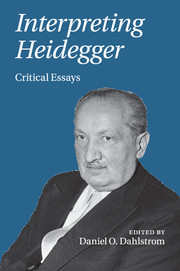Book contents
- Frontmatter
- Contents
- List of contributors
- Acknowledgments
- Method of citation and bibliography of Heidegger's works
- Introduction
- I Interpreting Heidegger's Philosophy
- II INTERPRETING HEIDEGGER'S INTERPRETATIONS
- 6 Being at the beginning: Heidegger's interpretation of Heraclitus
- 7 Being-affected: Heidegger, Aristotle, and the pathology of truth
- 8 Heidegger's interpretation of Kant
- 9 The death of God and the life of being: Heidegger's confrontation with Nietzsche
- 10 Heidegger's poetics of relationality
- III INTERPRETING HEIDEGGER'S CRITICS
- Index
9 - The death of God and the life of being: Heidegger's confrontation with Nietzsche
Published online by Cambridge University Press: 11 April 2011
- Frontmatter
- Contents
- List of contributors
- Acknowledgments
- Method of citation and bibliography of Heidegger's works
- Introduction
- I Interpreting Heidegger's Philosophy
- II INTERPRETING HEIDEGGER'S INTERPRETATIONS
- 6 Being at the beginning: Heidegger's interpretation of Heraclitus
- 7 Being-affected: Heidegger, Aristotle, and the pathology of truth
- 8 Heidegger's interpretation of Kant
- 9 The death of God and the life of being: Heidegger's confrontation with Nietzsche
- 10 Heidegger's poetics of relationality
- III INTERPRETING HEIDEGGER'S CRITICS
- Index
Summary
“Nietzsche” – der Name des Denkers steht als Titel für die Sache seines Denkens. Die Sache, der Streitfall, ist in sich selbst Aus-einander-setzung.
From the early lecture courses to the later works, one of the defining characteristics of Martin Heidegger's thought is its intricate and extensive engagement with the central figures of the Western philosophical tradition. However, on all accounts, and according to Heidegger's own self-understanding, his engagement with Friedrich Nietzsche was unlike any other. Heidegger delivered his first lecture course on Nietzsche in the winter semester of 1936/37 under the title “Nietzsche. The Will to Power.” This was followed the next semester with the companion lecture course “Nietzsche's Fundamental Metaphysical Position in Western Thought: The Eternal Recurrence of the Same.” With this second lecture course, Heidegger's early Nietzsche engagement in many ways reached its culmination. While Heidegger would continue to lecture on Nietzsche throughout the 1930s, 1940s, and into the 1950s, the emphasis in these later lectures was no longer on articulating Nietzsche's singularity as a thinker, but rather on interpreting Nietzsche's thought as exactly the culminating and essential expression of the metaphysical tradition as defined by its own ongoing and deepening obfuscation of the question of being. Although Nietzsche never posed the proper question of the truth of being, and thus, from the beginning, remained continuous with all preceding metaphysics, at the opening of the first lecture course Heidegger maintained, in the strongest terms, that his engagement with Nietzsche was explicitly structured as a confrontation [Auseinandersetzung] in which Heidegger's own philosophical task was directly implicated.
- Type
- Chapter
- Information
- Interpreting HeideggerCritical Essays, pp. 197 - 216Publisher: Cambridge University PressPrint publication year: 2011
- 1
- Cited by

